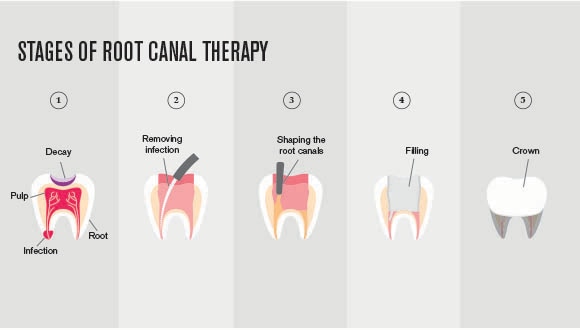Why root canal treatment isn't as bad as you might think
A tooth infection can be painful, but root canal treatment itself can be painless. Find out more about the procedure.
Health Agenda magazine
April 2019
Mention root canal treatment to most people and they’ll likely bring their hand to their mouth in horror (unless this procedure has saved one of their own teeth). The connotations include fear of pain and long-term discomfort but in fact the pain is often the result of the tooth infection, not the treatment. If you have a dental infection, treatment can not only eliminate pain, it can also stop the infection moving to the surrounding bone and prevent the tooth from needing to be removed.

How do you know if you have a dental infection?
According to Better Health, signs that you may have a root canal infection include:
- intense or prolonged sensitivity to hot or cold drinks and foods,
- toothache, whether spontaneous or triggered by chewing,
- tender and swollen gums, and
- swelling of the face.
In advanced infections it may not be obvious that a tooth is the source of your discomfort because the pain can radiate to the jaw, neck or ear.
What does root canal treatment involve?
Root canal treatment can take more than 1 visit to your dentist or endodontist (root canal specialist), and you may be required to spend up to 2 hours in the chair at a time. You often need to have an anaesthetic – usually a local, injected into the gum numbed beforehand. It’s often no more painful than a filling, reports Healthdirect.

The anatomy of a tooth infection
The root is the prong-shaped part of the tooth that anchors it to the jaw. A molar or back tooth may have several roots, front teeth usually have one. The hollow centre of the tooth is called the pulp chamber. In this chamber you’ll find blood vessels, nerves and sensitive tissue known as the pulp.
Bacteria may enter the root canal when a tooth is decayed, with advanced gum disease, when an old filling degrades, or if a tooth is cracked or damaged.
At your first appointment, your dentist will locate the damaged tooth.
“We discuss the treatment options and risks, and the restorative needs after root-canal treatment, such as a crown or onlay [a type of filling],” says Dr Jin-Seon Song, an endodontist working at HCF’s Sydney Dental Centre.
Root canal cost
At this stage a dentist should also provide a quote on the total anticipated cost before you agree on a treatment plan. We may cover some of or all of the fees involved, depending on your level of cover, so call us.
Speak to your dentist about costs beforehand, and call us on 13 13 34 for information about your cover and annual limits.
Stop the rot! Dental check ups
Visit your hygienist and dentist team every 6–12 months for a thorough check up to prevent treatments such as root canal therapy. Your dental team may also give you a scale and polish of your teeth. This will reveal whether old dental work is holding up or may be allowing bacteria to enter the tooth structure.
Your dentist can assess whether you clench or grind your teeth and provide you with a splint to prevent your teeth from fracturing and becoming infected, which can ultimately lead to bacteria entering the root canal. They can also assess and service your existing dental work and provide you with a mouthguard for sports to protect from dental trauma, if needed.
With most HCF extras cover, members get at least 1 dental check-up a year with dentists in our network. Learn about HCF’s More for Teeth benefits.
Related articles
How to be your own health advocate
How being an active participant in your health care can help you live a longer, healthier life.
Avoiding unexpected doctor’s costs
Understanding doctors' fees and charges is the key to avoiding bill shock.
Choosing the right health specialist
Private health insurance enables you to choose your medical specialist – here’s how to find the right one for you.
How to get the most from your GP visit
Maximising your time with your doctor can bring real health benefits.